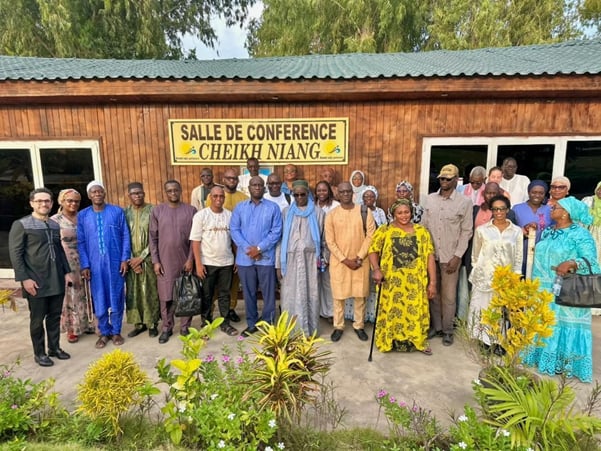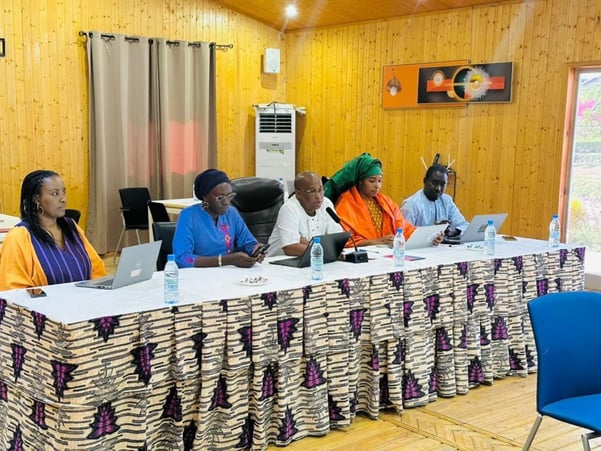
Projet WISH2 : vers une nouvelle stratégie de changement social et comportemental inclusive au Sénégal
Under the leadership of the Ministry of Health and Public Hygiene, a co-creation workshop was held in Saly as part of the WISH2 project on the reproductive health of young people and women. This meeting, organized by the Directorate of Maternal and Child Health (DSME) in partnership with the NGO RAES, brought together representatives of the State, technical partners, community and religious leaders, as well as associations of people living with disabilities, to develop a national social communication strategy for social and behavioral change (SBC).

This strategy aims to strengthen the impact of demand creation activities during phase 2 of the project through the integration of mass media and digital platforms in order to reach a wider and hard-to-reach audience, including people with disabilities.
Imam Elimane DIAGNE, president of the Collective for the modernization of daaras, emphasized the crucial role of religious leaders:
“Imams can relay these messages during sermons, weddings, or baptisms. These are special moments for listening, where we can raise awareness about maternal and child health, as well as the prevention of avoidable deaths.”
The strategy is structured around eight essential pillars:
. diagnosis and contextual analysis;
. information and education about family life;
. the change in individual and collective attitudes;
. the transformation of negative social norms;
. monitoring and evaluation;
community participation;
. gender integration and social inclusion (GESI);
. sustainability.
“The world is evolving, and for Ms. Sanou GNING, director of the WISH2 project for West and Central Africa, the goal is not to overturn social norms, but to make them evolve in a positive way:
“We don’t want to change all our social norms, but to advance them so that women can freely access reproductive health services. We need to innovate, adapt, and offer communities an informed choice.”
»
She also emphasizes the need for an evidence-based approach and continuous learning: mindsets are changing. Strategies must keep pace to remain effective and inclusive.

RAES, the technical partner on the CSC component of the project, leverages more than twenty years of experience in communication for social change, notably through flagship programs like C'est la vie!, which has accumulated more than 240 million views across all media in Africa.
RAES Executive Director Rabiatou Sangaré reminds us: “Sustainable change emerges when communities recognize themselves in the messages and stories they receive. Our role is to support this empowerment and help communities identify their own solutions.”
She specifies that the WISH2 project covers nine regions of Senegal and aims to contribute to the reduction of maternal and neonatal mortality, early pregnancies, gender-based violence (GBV), while improving the contraceptive prevalence rate.
At the end of the four days of work, participants will have a communication guide that takes into account the specific contexts of each region, defining the behaviors to be promoted, the key messages, the targets, the communication channels and the priority activities.
Under the coordination of the Ministry of Health and Public Hygiene, this strategy, co-created with communities, will mark a new step in promoting equitable, inclusive and sustainable access to reproductive health and family planning services in Senegal.
As a reminder, this project is implemented by a consortium of 6 international NGOs: RAES, MSI, Sightsavers, Options and IPAS with funding from the Foreign, Commonwealth and Development Office (FCDO).
Commentaires (2)
This reminds me of a crucial aspect often overlooked in health strategies: the specific challenges women face when traveling or accessing healthcare in different contexts. I recently read a very detailed women's health travel guide that delves into these issues, discussing everything from maintaining contraceptive regimens across time zones to managing common infections while abroad. Sorry for dropping a link here, but it provides a lot of context and might be useful for readers to fully understand the scope of these challenges, especially considering the project's goal of reaching wider audiences, including those in remote areas. The guide is here: https://pillintrip.com/de/article/womens-health-travel-guide-stay-safe-confident-worldwide
My question is: Given that the WISH2 project aims to integrate mass media and digital platforms to reach a broader audience, including hard-to-reach groups, are there any specific considerations within the communication strategy for addressing the unique health and access challenges faced by women who are frequently mobile, such as travelers, migrants, or nomadic communities? How does the strategy ensure these women receive consistent and accurate information about reproductive health despite changing locations and potential barriers in new environments?
Participer à la Discussion
Règles de la communauté :
💡 Astuce : Utilisez des emojis depuis votre téléphone ou le module emoji ci-dessous. Cliquez sur GIF pour ajouter un GIF animé. Collez un lien X/Twitter, TikTok ou Instagram pour l'afficher automatiquement.